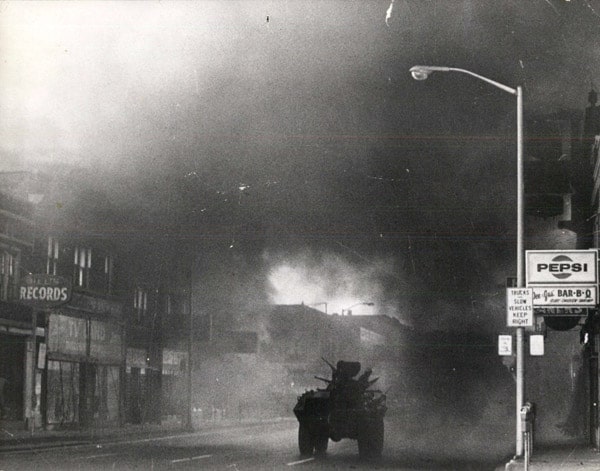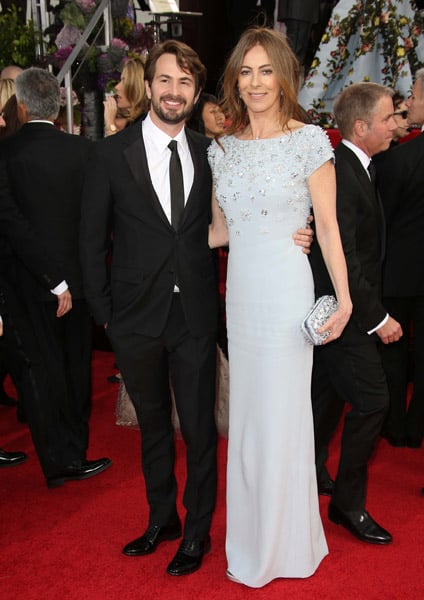‘Detroit’: A False Morality Play
Glen Lenhoff, American Renaissance, September 15, 2017
Today, the population of Detroit is 82 percent black, and white men make up only 15 percent of the police department; black people don’t worry much about white cops. But in 1967, Detroit was 62 percent white. The Detroit PD was a white male domain, and black citizens vehemently complained about police brutality.
The movie Detroit, written by Mark Boal and directed by Kathryn Bigelow, deals with the Algiers Motel incident, an event during the 1967 Detroit riots in which three young black men, Carl Cooper (Jason Mitchell), Fred Temple (Jacob Latimore), and Aubrey Pollard (Nathan Davis, Jr.), were killed by white Detroit police officers. The movie’s trailer invites viewers to “Discover the Truth.” But Detroit plays fast and loose with the facts and obscures the likely truth about this tragic incident, by turning it into an anti-white morality play.
The movie begins with some childish animation on the evils of racism derived from Jacob Lawrence’s “Migration” paintings. The real action begins with a police raid on a “blind pig,” or speakeasy, on Detroit’s fabled and sordid 12th Street; it was this raid that ignited the riots. The raid occurred around 3:30 a.m. on July 23rd, 1967. An irony never mentioned in the movie is that the raid was due to pressure from black Baptist ministers, who hated blind pigs for drawing money to liquor and prostitution that should have gone into collection plates. The ministers urged the white mayor, Jerome Cavanaugh, to shut down the illegal clubs.
Detroit does effectively portray the rising tension on 12th Street as the 82 black people arrested in the raid were led through the front door of the speakeasy. But curiously, it ignores two of the most important instigators of the riot. As William Scott, III, the son of the blind pig’s owner, stood in the street watching his father and sister being herded into a paddy wagon, he mounted a car and castigated the “peckerwood” police. Then Michael “Green Sleeves” Lewis, a Ford auto worker, urged the crowd to grab bottles and bricks and “start a riot.” Scott pitched a bottle at a police officer and threw a litter basket through the window of a store. The riot had begun; but these characters are absent from the move. Instead, it shows the crowd becoming frenzied as windows shatter and Molotov cocktails are hurled into stores and gas stations. The arson escalates. In one unforgettable scene, crowds throw bottles at firefighters who are trying to put out a fire that is destroying a store.
The scenes of the raid and early rioting take up about 20 minutes. Detroit then shifts its focus to the Algiers Motel incident, which dominates the rest of the movie.
A major character in the movie, Larry Reed (Algee Smith), is the lead singer in a Detroit band called the Dramatics. After their Fox Theatre show is suddenly cancelled on the third day of the riots, Reed and his best friend, a young black man named Fred Temple, make their way to the Algiers Motel, a well-known site of prostitution and vice.
The early Algiers scenes focus on two white girls, Karen Malloy (Kaitlyn Dever) and Julie Hysell (Hannah Murray), who try to get physical with Reed, Temple, and Aubrey Pollard as other young black men watch. The narrative then takes a fateful turn when Carl Cooper, who was also at the Algiers, fires a harmless starter pistol toward a police cruiser from a third-floor window.

Hannah Murray at the ‘Detroit’ Film Premier, London, UK (Credit Image: © James Shaw/Avalon via ZUMA Press)
After three days of riots, Detroit police were keenly aware of the threat posed by black snipers. Earlier that same day, beloved officer Jerome Olshove had been killed by snipers. But in an egregious omission, Detroit says nothing about Olshove’s murder or about the sniper activity. Understandably, police were in an extremely aggressive mood on the night of July 25th.
Hearing Cooper’s shots, Detroit police officers, National Guardsmen, and Michigan state police rushed the Algiers Motel annex. Detroit PD Officers Krauss (Will Poulter), Flynn (Ben O’Toole), and Demens (Jack Reynor) are the three police antagonists in the movie. (Krauss and Flynn are composite characters reflecting elements of the real life Detroit Police Officers David Senak and Robert Paille. Demens is based on the real-life Detroit Police Officer Ronald August, so I henceforth refer to him as August.) As the police enter, Krauss sees Carl Cooper running down the hallway and shoots him dead. As other officers swarm the Algiers annex, Krauss drops an open knife by the fallen Cooper. (The Cooper shooting is portrayed as cold-blooded murder, but the context is important: Police had every reason to think there was a sniper in the building. Officer Olshove had been shot that day, and a Detroit police station had come under fire. It is, however, generally accepted that a police officer planted the knife.)

Jul. 26, 1967 – Lone tank manned by troops rumbles toward flames of a fresh fire along shattered remains of 12th St. Credit: The Detroit News. (Credit Image: © Keystone Press Agency/Keystone USA via ZUMAPRESS.com)
Officers Flynn and August charge into a bedroom on the third floor of the annex. They find Julie and Karen sitting on a bed with a black Vietnam veteran named Robert Greene (Anthony Mackie). The officers herd Greene, Julie, and Karen downstairs and force them to stand facing a wall with their hands on the wall. The officers then force the other black youths in the annex, Michael Clark (Malcom David Kelley), Lee (Peyton ‘Alex’ Smith), and James Sortor (Ephraim Sykes), to do the same. The most disturbing part of the Algiers Motel incident then unfolds.
With Krauss as the ringleader, the three officers begin a vicious interrogation tactic known as the “death game.” Krauss beats and taunts the prisoners and forces them to pray for mercy. The officers then take the men one by one into bedrooms off the hallway. The officers fire shots in the air and warn each captive to pretend he’s dead. Krauss then warns the other prisoners that they too will be murdered unless they disclose who the sniper is. Julie and Karen are taken into a bedroom, slapped around by Flynn and Krauss, and taunted as “nigger lovers.” Krauss and Flynn beat Greene and insist he is a pimp for Julie and Karen.
The protracted death game scene culminates when August shoots and kills the defenseless Aubrey Pollard — one of the blacks the white girls were cozying up to. August did not understand that he was supposed to merely pretend to shoot Pollard. Detroit shows August shooting Pollard to death as Pollard begs for his life with his hands raised. But at his murder trial, August claimed that he shot Pollard in self-defense because Pollard had reached for August’s gun. As the “death game” was still in progress, Pollard may well have reached for August’s gun, thinking he would be shot to death anyway.
Near the end of the Algiers Motel scene, Krauss murders Fred Temple because Temple will not promise to keep quiet about the killings. In fact, many scholars believe that Temple, along with Cooper, was killed by the police when they first rushed the Motel annex. In legal proceedings, Officer Paille testified that he shot Temple in self-defense, and no witness ever testified that Paille gunned down Temple because Temple refused to promise to keep quiet. Krauss’s cold-blooded murder of Temple is entirely the creation of Miss Bigelow and Mr. Boal.
The final stretch of the movie depicts Patrolman Ronald August’s trial for the murder of Aubrey Pollard. An all-white jury found August not guilty. Predictably, Mr. Boal and Miss Bigelow portray this verdict as simple white racism while omitting historically important facts. They omit August’s testimony that he shot Pollard in self-defense as Pollard reached for his gun. They also omit one of the most striking miscalculations in the trial, when the prosecutor demonstrated the sound of the starter pistol in the courtroom. The loud boom had the opposite of its intended effect, making the jurors sympathetic to the terror felt by the officers, who believed they were under genuine sniper attack. Finally, the movie does not portray the powerful closing statement of August’s attorney, Norman Lippett, in which he compares August to a soldier under fire in a war. Mr. Boal and Miss Bigelow have deliberately omitted anything that might seem to justify the jury’s verdict (or, by extension, August’s actions).

Officer Ronald August
Detroit would have you believe that the jury acquitted August because he, like the jury, was white. It does not mention that a second jury acquitted August, Senak, and Paille of federal civil rights conspiracy charges. And in yet a third trial, an all-white jury acquitted Melvin Dismukes, a black private security guard who was also present at the Algiers Motel death game, of felonious assault charges.
In his 1968 book The Algiers Motel Incident, John Hersey opined that Dismukes participated in the police misconduct. At Dismukes’s trial, James Sortor, one of the blacks at the Algiers, testified that Dismukes had beaten him. But in Detroit, Dismukes — played by John Boyega — is portrayed as a good person caught in a difficult situation. Mr. Boal and Miss Bigelow clearly imply that Dismukes, as a black man, is morally superior to the white law enforcement officers.

Screenwriter Mark Boal and director Kathryn Bigelow (Credit Image: © Martin Sloan/UPPA/ZUMAPRESS.com)
It is tragic that three teenagers were shot to death in the Algiers Motel. Carl Cooper (age 17), Aubrey Pollard (age 18), and Fred Temple (age 18) were far too young to die. It is beyond sad that a talented young musician like Larry Reed — a man of gentleness and promise — has lived for the last 50 years haunted by memories of the Algiers Motel incident.
Mr. Boal and Miss Bigelow have the right to revisit the 1967 calamity that broke the heart of Detroit. They also have the right to portray the moral ambiguity and even sadism of the Algiers Motel incident. But they have no right to omit and twist the facts, and then advertise Detroit as a “true story.” A more fitting trailer for Detroit would say: “Don’t trust this movie.”















